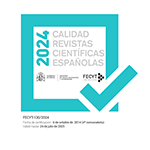Acercamiento etimológico al cast. (gall.-port.) buscar: lat. poscere
Abstract
The purpose of this article is to propose an etymological relationship between cast. (gal.-port.) buscar and lat. poscere ‘to ask for’. From a semantic point of view, since both verbs imply a privative opposition of terms meaning ‘to try to obtain’ (cast. buscar-pedir; lat. quaerere-petere-poscere), closely related with the verbs of volition (cast. querer, lat. uelle), the loss of uelle in castilian and the choice of quaerere to take its place could have caused the meaning of the ‘to try to obtain’ verbs to change, and, more specifically, the verb poscere to stop meaning ‘to ask for’ in order to mean ‘to look for’. The final form sprang from the mutual interference of the first persons of the simple present of poscere (posco) and of a verb imported from Europe into the north-western section of the Iberian Peninsula in the 11th century, boscare-buscare (bosco-busco), which meant ‘to do something in the forest’.Downloads
Article download
License
In order to support the global exchange of knowledge, the journal Cuadernos de Filología Clásica. Estudios latinos is allowing unrestricted access to its content as from its publication in this electronic edition, and as such it is an open-access journal. The originals published in this journal are the property of the Complutense University of Madrid and any reproduction thereof in full or in part must cite the source. All content is distributed under a Creative Commons Attribution 4.0 use and distribution licence (CC BY 4.0). This circumstance must be expressly stated in these terms where necessary. You can view the summary and the complete legal text of the licence.








